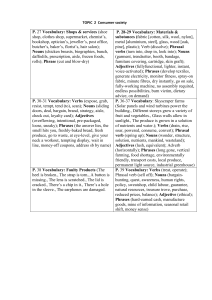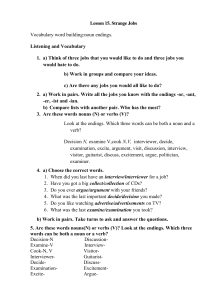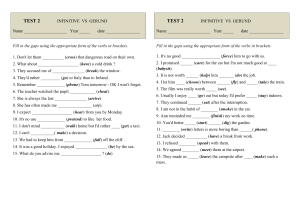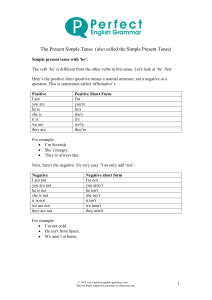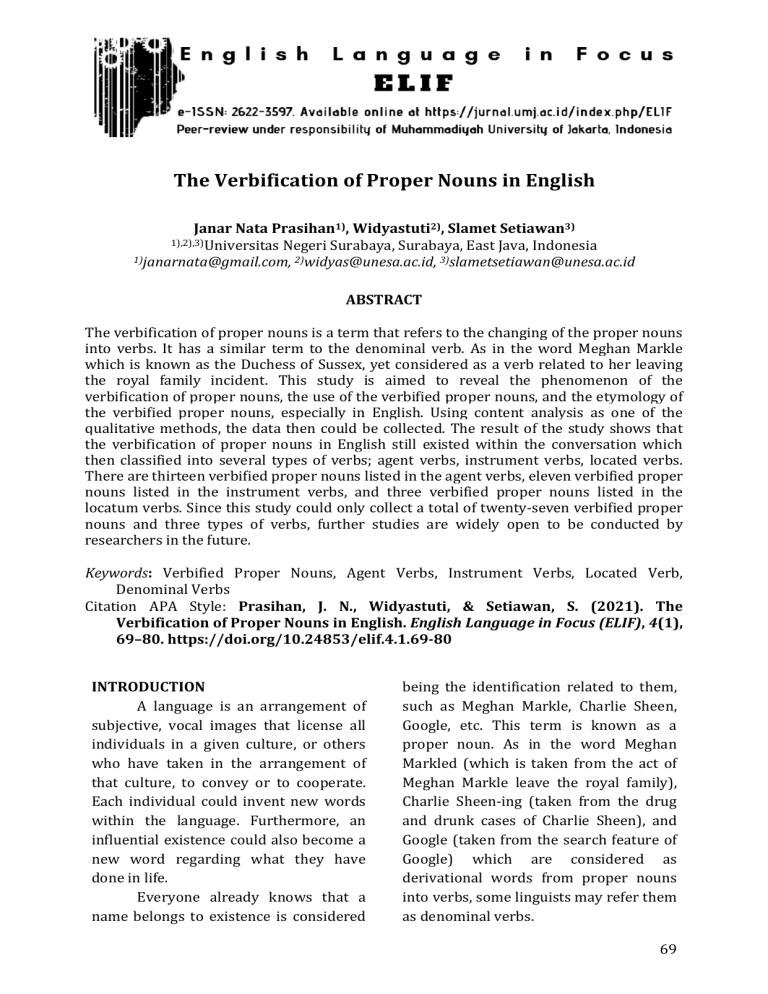
The Verbification of Proper Nouns in English Janar Nata Prasihan1), Widyastuti2), Slamet Setiawan3) 1),2),3)Universitas Negeri Surabaya, Surabaya, East Java, Indonesia 1)janarnata@gmail.com, 2)widyas@unesa.ac.id, 3)slametsetiawan@unesa.ac.id ABSTRACT The verbification of proper nouns is a term that refers to the changing of the proper nouns into verbs. It has a similar term to the denominal verb. As in the word Meghan Markle which is known as the Duchess of Sussex, yet considered as a verb related to her leaving the royal family incident. This study is aimed to reveal the phenomenon of the verbification of proper nouns, the use of the verbified proper nouns, and the etymology of the verbified proper nouns, especially in English. Using content analysis as one of the qualitative methods, the data then could be collected. The result of the study shows that the verbification of proper nouns in English still existed within the conversation which then classified into several types of verbs; agent verbs, instrument verbs, located verbs. There are thirteen verbified proper nouns listed in the agent verbs, eleven verbified proper nouns listed in the instrument verbs, and three verbified proper nouns listed in the locatum verbs. Since this study could only collect a total of twenty-seven verbified proper nouns and three types of verbs, further studies are widely open to be conducted by researchers in the future. Keywords: Verbified Proper Nouns, Agent Verbs, Instrument Verbs, Located Verb, Denominal Verbs Citation APA Style: Prasihan, J. N., Widyastuti, & Setiawan, S. (2021). The Verbification of Proper Nouns in English. English Language in Focus (ELIF), 4(1), 69–80. https://doi.org/10.24853/elif.4.1.69-80 INTRODUCTION A language is an arrangement of subjective, vocal images that license all individuals in a given culture, or others who have taken in the arrangement of that culture, to convey or to cooperate. Each individual could invent new words within the language. Furthermore, an influential existence could also become a new word regarding what they have done in life. Everyone already knows that a name belongs to existence is considered being the identification related to them, such as Meghan Markle, Charlie Sheen, Google, etc. This term is known as a proper noun. As in the word Meghan Markled (which is taken from the act of Meghan Markle leave the royal family), Charlie Sheen-ing (taken from the drug and drunk cases of Charlie Sheen), and Google (taken from the search feature of Google) which are considered as derivational words from proper nouns into verbs, some linguists may refer them as denominal verbs. 69 English Language in Focus (ELIF), 4(1),69-80. https://doi.org/10.24853/elif.4.1.69-80 In the right context, this study readily understands I Meghan Markled my ex last night and never returned his texts (The Guardian) or Then we did some Charlie Sheen-ing and we were fine (The New York Times), or go places, google things (The New York Times). Thus denominal verbs are taken from their most influencing feature or act. Denominal verbs based on proper nouns are common, although most are virtually complete idioms (Clark & Clark, 2010). According to (Crutch & Warrington, 2004), person names are one of the most common categories of proper nouns investigated by cognitive scientists. This, imply that the verbs created from proper nouns are common as is explained by (Clark & Clark, 2010). Proper nouns have two distinct features: They name explicit stand-out things, and they start with capital letters, regardless of where they happen inside a sentence. But the verbification of proper nouns could not be easily understood by everyone since not all of them are worldwidely known by people. There is a set particular of that verbification of proper nouns use are regulated by a convention: in using such a verb, the interlocutor means to denote the kind of state, event, or process that, he/she has good reason to believe (whether it depends on their feeling or situation), the listener can readily and uniquely compute on this occasion, based on their mutual knowledge (Clark & Clark, 2010). To figure out what they mean on a given event, somebody needs to know the meaning of their parts, yet in addition the time, spot, and conditions under which they are explained. 70 There are two previous studies with which this study has similarities. This study has similarities to the research conducted by (Clark & Clark, 2010) in which analyzing the phenomena of nouns surface as verbs, utilizing the theory of derivational morpheme initiated by (Carstairs-mccarthy, 2002). But, the research conducted by (Clark & Clark, 2010) is way too broad regarding the object used in the research are taken from mostly nouns. The results of their works show that even though denominal verbs belong to a single morphological family (they are all parented by nouns), they do not allow a unified semantic description (Clark & Clark, 2010). Another previous study is conducted by (Smirnova & Shustova, 2017). The area of study they investigate is to explore changes of verb valency using noun-incorporation utilizing the (Feist, 2013) theory. However, the research conducted by (Smirnova & Shustova, 2017) shows that their main purpose is to show that The inclusion of actants involves a simple or complex shift in verb valency, which simplifies the syntactic structure of a phrase while complicating its semantics. Therefore, this study will try to focus on filling the gap of the proper nouns verbified as verbs. Unlike the previous studies which are not mainly focused to analyze the verbification of proper nouns, this study would try to ask: 1) What verbified proper nouns have existed? 2) How do the uses of the verbified proper nouns occur? 3) What etymology of the verbified proper nouns are? This study tries to fill in the gap by analyzing the phenomenon of the verbification of proper nouns, the use of the verbified Prasihan, J. N., Widyastuti, & Setiawan, S. (2021). The Verbification of Proper Nouns proper nouns, and the etymology behind the verbification of proper nouns. Moreover, constantly deriving words into another word-class may also affect one’s ability to produce a change within the language. Hence, research on whether or not this situation is encountered by English speakers would be provided. In investigating the data, some theories are certainly considered necessary as the base and references of the study. The following fraction is a review of theories together with the broad concept of morphology theory. The theory presented spin around denominal verbs as enclosed to its explanations and factors influencing the verbification of proper nouns. Lastly, there are some previous studies conducted by other researchers on the same topic as the materials refer to. Denominal Verbs According to (Gerdts & Marlett, 2008), denominal verbs have a broad variety of meanings. Shortly in the simple sense, the term denominal verbs may inefficiently apply to any nominal that is used as a verb. The denominal verbs appear in construction-specific environments (e.g., to phone, to shelve, etc). Similar to the explanation from (Bandi-Rao & Murphy, 2007), denominal verbs are verbs derived from nouns that might represent a problem for singleroute techniques (e.g., a scale – to scale). Agent Verbs, Instrument Verbs, Locatum Verbs Agent verbs are taken from the parent nouns that denote roles or professions that people take on deliberately. It usually consists of things whose predominant feature is that they do certain things (Clark & Clark, 2010). Similar to (Griffith, 2006), the concept of the agent verbs was introduced earlier in connection with unergative clauses which have agent subjects and unaccusatives which do not. Instrument verbs are known for their potential roles as instruments. One of their predominant features is that certain activities must be carried out when they are physically present, or certain results must be accomplished. It is a predominant feature of ambulances that they are instruments for transporting the sick or wounded; a predominant feature of glue is that it is an instrument for attaching one object to another. (Clark & Clark, 2010) Locatum verbs are considered as the verbs in which the parent nouns are in the objective case. It usually consists of things whose predominant feature is that the parent clause is described as locations. (Acedo-Matellán & RealPuigdollers, 2015) stated that locatum verbs are involving a preposition of central coincidence. RESEARCH METHODOLOGY To the study of a problem, the research could be explained as the application of the scientific approach. Therefore, research is considered to seek for the solving relate with a problem which wants to be answered. The research questions in this study are about the phenomenon of the verbification of proper nouns, the use of the verbified proper nouns in conversation, and the etymology of the verbified proper nouns. The qualitative method was applied for this study because the answers to the provided 71 English Language in Focus (ELIF), 4(1),69-80. https://doi.org/10.24853/elif.4.1.69-80 research questions would be in the form of words or phrases also sentences, and not in numerical data. Qualitative research, like quantitative research, needs the same set of abilities to do and publish. Furthermore, qualitative researchers may face unique problems. They may have to overcome prejudice and communication barriers within the scientific community (Stenius, Mäkelä, Miovský, & Gabrhelík, 2017). According to (Bogdan & Biklen, 2007), qualitative research is a descriptive analysis in which the data is in the form of words instead of numeric, and they declare that some qualitative researchers rely upon interview transcripts with different kinds of data sources. Simply short, qualitative research deals with structures and patterns (Litosseliti, 2010). This study used content analysis as the research technique. According to (Krippendorff, 1989), content analysis refers to a research technique that makes replicable and valid inferences from data to its context. The data for this research technique is in the form of a citation of context (phrase or sentence) taken from Twitter. Sources of the data are the important aspect of conducting qualitative research. Thus, the sources of the data of this study were the verbified proper nouns collected from Twitter’s user (T). To help this study for analyzing the etymology of the data, this study uses some dictionaries such as; Urban Dictionary (UD), Lexico Oxford English Dictionary (LOED), and Oxford Advanced Learner’s Dictionary (OALD), Merriam Webster Dictionary (MWD), and the 72 words origin from Etymology Dictionary (ED), Wordhippo (WH), and Thesaurus Dictionary (TD). FINDING AND DISCUSSION The finding on this sub-chapter is purposed to discuss the first and second research questions. The verbified proper nouns collected in this study were then categorized according to their predominant features as in Table 1 to Table 3. In the agent verb, the parent clause is in the agentive case. Diddle is such a verb, as shown by the relation between the verb diddle in (1) and the proper noun Diddle in (2), a paraphrase: (1) They diddle the old guy. (2) They did something to the old guy the Diddle’s act that [take advantages by cheating the old guy] Extending the relationship terminology, this study will call the clause in square brackets (2) the 'parent clause' for the verb diddle. In the parent clause, the diddle is in the agentive case. By definition, the parent clauses for agent verbs describe the roles/acts/professions of the agents. Altered appropriately, the paraphrase in (2) works fairly well for the other agent verbs in Table 1. Most of the agent verbs are taken from the influential person whose roles, acts, even their professions give an impact on society. All the other agent verbs in Table 1 also fit this pattern. Verbified Proper Nouns Utterance Diddle “Y'know it's really not that hard to not diddle children, like c'mon seriously” Meghan Markle “…when I explained a racist Prasihan, J. N., Widyastuti, & Setiawan, S. (2021). The Verbification of Proper Nouns situation so I “Meghan Markled” Fudge “also many a law-keeper to fudge evidence.” Lynch “I agree with his mother. Their was intent to kill. First degree murder for this lynching.” Charlie Sheen “your probably right...but it is gunna be nice to start charlie sheening all the time again” Pander “im done trying to pander to people.” Philander “Buttering us up for philandering Charlie as King.” Burke “Andhra Pradesh and Telangana too are burking numbers blatantly.” Hector “…when necessary is much better than hectoring and arguing as soon as they speak.” Houdini “Gets into bdsm and bondage only to get good at houdini’ing my way out of the ropes and frustrating my partner” Boycott “I hate that we have to boycott the MLB now cause I’ve finally trained my fiancé…” Dragoon “Officials try dragooning Palestinians into negotiations they know will fail.” Bogart “…homeowners don’t have the right to bogart the school’s parking” This is quite different from the instrument verbs. While the agent verbs predominant feature is solely based on the roles or professions that people take on deliberately, the instrument verb predominant feature is taken from the function of its parent proper noun. Most of the instrument verbs are taken from the name of a brand. Windex is such a verb, as shown by the relation between the verb windex in (3) and the proper noun Windex in (4), a paraphrase: (3) Ronnie has already windexed the window (4) Ronnie did something to the window that [clean the window with Windex; a glass cleaner] In (4), windex is in the instrumental case; so in (3) windex is an instrument verb. Consider Windex as (4) shows, it stated that Ronnie was doing something to the window using Windex. (3) expresses (or contains) the complement Ronnie was windexing the window, which describes the result that Ronnie did about by his use of the Windex: he caused himself to clean the window by using Windex. This is then called complement reducing which was explained by (Clark & Clark, 2010). Those kinds of sentences are then divided notionally into a causative portion (Ronnie caused himself to clean the window) and an instrumental portion (by Ronnie's Windex). It is the same with, Ornell xeroxed the files divides into Ornell caused the files to be copied and by Ornell’s Xerox; and Duncann fedex his package divides into Duncann caused his package to be sent and by Duncann's shipment order through FedEx. As (4) shows, this means simply 'Ronnie did something to the window that [clean the window with Windex; a glass cleaner].' In this paraphrase, the Windex is an instrument for cleaning the glass; the cleaning itself is not instrumental in accomplishing something else. All the other instrument verbs in Table 2 also fit this pattern. Verbified Proper Nouns Utterance Hoover “My mum hoovering at 7am because there's guest coming over” 73 English Language in Focus (ELIF), 4(1),69-80. https://doi.org/10.24853/elif.4.1.69-80 Scotch-tape “Actually, not really. It's mostly just flags scotchtaped to a wall.” Xerox “Fortifying elections using Xeroxed copies isn’t just fraud.” Google “You just Google colour + your birthday.. Then see wht colour tht you got ” FedEx “Sure just drop the addy and I'll fedex it to u” Windex “if u can windex glasses why Cant u windex eye ball” eBay “Ebay’d a vintage coat to complement my favorite hat.” WhatsApp “My dad just whatsapped me to tell me it's 15 years since my prom.” Ajax “I've done the hoovering, ajaxed the sink and now I'll(forgive me) google for some more.” Vim “Because pot has been vimed clean but kettle is still ashy” Clairol. “We know this because Lindsay Miss Clairoled her hair to try to match Donald, but didn't quite make it.” Locatum verbs are picked out from their predominant feature that the parent nouns are in the objective case in clauses that describe the location of one thing concerning another (Clark & Clark, 2010). Pampers is such a verb, as shown by the relation between the verb pampers in (5) and the proper noun Pampers in (6), a paraphrase: (5) Kath pampers’ed the baby (6) Kath did something to cause it to come about that [the baby had a Pampers on] 74 Locatum verbs express the event of movement of the theme to the place. Thus, then divided into theme (verb) and place (object). As (6) shows, it stated that Kath placed the Pampers on the baby. The movement was existed in (5), the theme (pampers’ed) moves to the place (the baby). ‘the baby’ in (5) represents locative parents. It is the same with, Miller duluxed the wall. The movement was Miller caused the Dulux to be placed on the wall, not Miller caused the wall to be placed on the Dulux. This could be stated that locatum verbs demonstrate that the theme of locatum verbs provides descriptive information about a property or characteristic of the object. Locatum verbs often look very much like instrument verbs. The contrast is that locatum verbs have consequent states in which the parent noun plays an intrinsic role as the thing placed or the location at which it is placed, whereas instrument verbs do not (Clark & Clark, 2010). All the other locatum verbs in Table 3 also fit this pattern. Verbified Proper Nouns Utterance Crisco “My mom crisco'ed her face for years. It was her skincare secret & it worked.” Dulux “Now with Christmas cancelled chez Bayliss, there's a lot of Duluxing to be done.” Pampers “Oh, you meant “pampers’ed” ?” Verbification Process This study has been collecting the data of the verbified proper nouns in the form of a sentence taken from Twitter. Prasihan, J. N., Widyastuti, & Setiawan, S. (2021). The Verbification of Proper Nouns Since this study has not always been able to note them down, the researcher then appends a list of the verbified proper nouns of which this study has preserved a record. In each entry, the order of the material will be: verbified proper nouns.1 “citation of the context (phrase or sentence)”.2 Meaning.3 Etymology.4 A verbified proper noun collected from a written document will be preserved the sources that were already abbreviated5. For example in the agent verbs category: Diddle.1 “Y'know it's not that hard to not diddle children, like c'mon seriously”.2 To get some advantages from somebody by cheating them.3 Word origin: taken from the name of Jeremy Diddler, a character in the farce Raising the Wind [1803].4 (T, OALD)5 To make the record easier to be read, this study decides to structure the record as in orders above. The entry states that 1 is the verbified proper nouns, the next sentence in 2 is the utterances taken from Twitter, 3 is the meaning of the verbified proper nouns, 4 is the etymology behind the verbification of proper nouns, and 5 is the source where the data taken. The meanings of the verbified proper nouns are usually taken from the proper nouns’ most known act for agent verbs and feature for instrument and locatum verbs. As for the meaning of “diddle – to get advantages by cheating”, it is taken from the act of Jeremy Diddler (a character in the farce Raising the Wind) who likes to cheat to get advantages. The etymology could also be considered as the reason the verbification of proper nouns is being processed. As for 5 that shown in the example, T is the abbreviation of Twitter which is where the utterance is taken from and OALD is the abbreviation of Oxford Advanced Learner’s Dictionary which is where the etymology of the data is taken from. All the entries in the agent verbs fit this same pattern. Agent Verbs Diddle. “Y'know it's really not that hard to not diddle children, like c'mon seriously”. To get some advantages from somebody by cheating them. Word origin: taken from the name of Jeremy Diddler, a character in the farce Raising the Wind [1803]. (T, OALD) Meghan Markle. “…when I explained a racist situation so I “Meghan Markled” that friendship”. To leave a room, situation, environment in which your authentic self is not welcomed or wanted. Word origin: which is taken from the act of Meghan Markle leaves the royal family. (T, UD) Fudge. “also many a law-keeper to fudge evidence.”. To deal with something in a way that avoids giving clear information. Word origin: taken from the name of Captain Fudge, “who always brought home his owners a good cargo of lies” [Isaac Disraeli, 1791, citing a pamphlet from 1700]. (T, OALD, ED) Lynch. “I agree with his mother. Their was intent to kill. First degree murder for this lynching.”. To kill without legal sanction. Word origin: taken from Lynch Law [1811] which is named after William Lynch of Pittsylvania, Virginia, who [1780] led a vigilance committee to keep order there during the Revolution. (T, ED) Charlie Sheen. “your probably right...but it is gunna be nice to start charlie sheening all the time again”. Getting a respect while being publicly intoxicated. Word origin: taken from the drug and drunk cases of Charlie Sheen. (T, UD) Pander. “im done trying to pander to people.”, To give satisfaction to. Words origin: taken from Pandare, the name of a character in the English writer Chaucer’s Troilus and Criseyde who acts as the lovers’ gobetween [early 17th century]. (T, ED, OALD) Philander. “Buttering us up for philandering Charlie as King.”. To pay court to women, especially without serious intent; flirt. Word origin: taken from Philander [1700], popular name for a lover in stories, drama, and poetry, from Greek adjective philandros. (T, ED) Burke. “Andhra Pradesh and Telangana too are burking numbers blatantly.”. To murder without leaving a trace on the body. Word origin: abstracted from William Burke, executed in Edinburgh [1829] for murdering several persons to sell their bodies for dissection. (T, ED) Hector. “…when necessary is much better than hectoring and arguing as soon as they speak.”. To try to 75 English Language in Focus (ELIF), 4(1),69-80. https://doi.org/10.24853/elif.4.1.69-80 make somebody do something by talking or behaving in an aggressive way. Word origin: taken from the Trojan warrior named Hector. (T, OALD) Houdini. “Gets into bdsm and bondage only to get really good at houdini’ing my way out of the ropes and frustrating my partner”. To undetectably escape from a restriction. Word origin: taken from the act of Harry Houdini, an escape artist or other ingenious person [1923]. (T, ED) Boycott. “I hate that we have to boycott the MLB now cause I’ve finally trained my fiancé…”. To refuse to buy, use or take part in something as a way of protesting. Word origin: taken from the name of Captain Charles C. Boycott, an Irish land agent treated in this way in [1880], in an attempt instigated by the Irish Land League to get rents reduced. (T, OALD) Dragoon. “Officials try dragooning Palestinians into negotiations they know will fail.”. To force into submission or compliance especially by violent measures. Word origin: Taken from the dragonish nature of the dragoons who persecuted the French Protestants in the [17th century], during the reign of Louis XIV. (T, MWD) Bogart. “…homeowners don’t have the right to bogart the school’s parking”. To selfishly appropriate or keep (something, especially a cannabis cigarette). Word origin: taken from the act of Bogart, Humphrey, who often smoked in films [1960s]. (T, LOED) Almost all of the verbified proper nouns in the agent verbs are taken from the name of the influential person, while some are taken from the name of the fictional character. As for the entry in the instrument verbs: Xerox.1 “Fortifying elections using Xeroxed copies isn’t just fraud.”.2 To make a copy of a letter, document, etc by using Xerox.3 Word origin: taken from a name of a photocopy machine trademark [1965].4 (T, UD, ED)5 The meaning of “xerox – to make a copy of the document” is not taken from the act of Xerox who likes to make a copy of the document. In instrument verbs, the meanings of the verbified proper nouns are taken from the most known features of the proper nouns. Xerox is most known as a photocopy machine that could make a copy of the letter, 76 document, etc. Thus, the meaning of the verb xerox was then taken from. All of the verbified proper nouns that are in the instrument verbs are taken from the name of a brand and fit the same pattern as the verb xerox. Instrument Verbs Hoover. “My mum hoovering at 7am because there's guest coming over”. To vacuum with Hoover. Word origin: a proprietary name for a vacuum cleaner trademark [1926]. (T, UD) Scotch-tape. “Actually, not really. It's mostly just flags scotchtaped to a wall.”. To stick with transparent adhesive tape; Scotch-tape. Word origin: a proprietary name for a tape trademark [1930]. (T, LOED) Xerox. “Fortifying elections using Xeroxed copies isn’t just fraud.”. To make a copy of a letter, document, etc by using Xerox. Word origin: taken from a name of a photocopy machine trademark [1965]. (T, UD, ED) Google. “You just Google colour + your birthday.. Then see wht colour tht you got ”. To search something on the Google search engine. Word origin: taken from the search feature of famous online search engine, Google. (T, OALD, ED) FedEx. “Sure just drop the addy and I'll fedex it to u”. To ship something with FedEx shipping. Word origin: proprietary name for a shipping expedition trademark. (T) Windex. “if u can windex glasses why Cant u windex eye ball”. To clean up something with Windex. Word origin: a proprietary name for the house hold ant killer, that help jellyfish stings, and also cleans windows [1933]. (T, UD) eBay. “Ebay’d a vintage coat to complement my favorite hat.”. To buy or sell (goods) through the eBay website.. Word origin: taken from the proprietary name of the website eBay [1997]. (T, LOED) WhatsApp. “My dad just whatsappedme to tell me it's 15 years since my prom.”. Sending a message through whatsapp. Word origin: a proprietary name for a messenger application trademark [2009]. (T, UD) Ajax. “I've done the hoovering, ajaxed the sink and now I'll(forgive me) google for some more.”. To clean the water sink with Ajax. Word origin:a proprietary name for household cleaning products and detergents trademark [1947]. (T) Vim. “Because pot has been vimed clean but kettle is still ashy”. To clean the toilet floor with Vim. Word origin: a proprietary name for household cleaning products trademark [1904]. (T) Clairol. “We know this because Lindsay Miss Clairoled her hair to try to match Donald, but didn't quite make Prasihan, J. N., Widyastuti, & Setiawan, S. (2021). The Verbification of Proper Nouns it.”. To dye hair with Clairol. Word origin: a proprietary name for hair coloring and hair care trademark [1931]. (T) As for the locatum verbs, the meanings of the verbified proper nouns are not taken in the same term as in the agent verbs nor as in the instrument verbs. The meaning could be simply known from the movement of the theme to the place as explained in 4.1 about locatum verbs. All the entries in the locatum verbs fit the same orders like the other types of verbs. Locatum Verbs Crisco. “My mom crisco'ed her face for years. It was her skincare secret & it worked.”. To apply Crisco on to something. Word origin: An American brand of shortening that is produced by B&G Foods, introduced in June [1911]. (T, OALD) Dulux. “Now with Christmas cancelled chez Bayliss, there's a lot of Duluxing to be done.”. To apply Dulux on to somewhere. Word origin: a proprietary name of architectural paint trademark [1931]. (T, OALD) Pampers. “Oh, you meant “pampers’ed” ?”. To put pampers on. Word origin: a proprietary name of baby and toddler products marketed by Procter & Gamble [1956]. (T) This study found that the verbified proper nouns were classified into three types of verbs. More than that, this study took a note that as in the case of the verbification of proper nouns, it appears that some taken from the name of a brand (e.g., Google, Dulux, Scotchtape, etc), some taken from an influential individual (e.g., Boycott, Houdini, Meghan Markle, Charlie Sheen, etc), and some taken from the name of a fictional character (e.g., Philander, Pander, etc). It seems that there seems to be no limitation in taking the proper noun being verbified. However, to create such a verb from a proper noun, the thing that should be considered is what proper nouns’ feature the most known by the mutual agreement between the speaker and the recipient is. The verbified proper nouns may be used transitively, whether the structure includes a proper noun with the meaning of 'direct meaning' or not (e.g., ‘you should hoover the carpet;’ ‘can I Xerox the file?’). They may also occur in the passive, in such sentences as 'Kim did not know that her glass has been windexed by Wu’. According to (Clark & Clark, 2010), one of a knowledge that interprets the speaker and/or listener is called intellectualize information. It is used by the speaker and/or listener to characterize verbified proper nouns based on the knowledge of English. Intellectualizable information is a knowledge that enlightens most people who could not figure out for themselves the relationship between the verbified proper nouns and their origins (e.g., most people do not know the relation between the verb lynch and the proper noun William Lynch, but when they were informed by a dictionary or a specialist, they would then in some sense have the knowledge of the verb lynch. CONCLUSION Based on the finding, this study has preserved twenty-seven data of verbified proper nouns taken from Twitter which are then classified either into agent verbs, instrument verbs, or 77 English Language in Focus (ELIF), 4(1),69-80. https://doi.org/10.24853/elif.4.1.69-80 locatum verbs depends on what kind of predominant feature they have. The utterances were taken from Twitter also implies on how the use of the verified proper nouns has occurred. The use of various dictionaries is needed due to finding the process and the etymology behind the verbification of proper nouns. To avoid the misinterpreting of the verbified proper nouns within the conversation and what they mean, it depends whether they know the meaning of their parts, yet in addition of the time, spot, and conditions under which they are explained or not. Thus, the essential use of such kinds of rationality, situation, uniqueness, and the speaker's and/or the listener's mutual knowledge could then be understood. The data preserved by this study are still far from representing the totality of such verbification of proper nouns. This study still needs many further attestations, especially since they are continually being created in the current conversation. Even an intensive survey of contemporary literature and journalism could not be exhaustive, since a large number of the verbification of proper nouns could be lost forever if not recorded by someone among the immediate hearers. REFERENCES Acedo-Matellán, V., & Real-Puigdollers, C. (2015). Location and locatum verbs revisited: Evidence from aspect and quantification. Acta Linguistica Hungarica, 62(2), 111–140. https://doi.org/10.1556/064.2015. 62.2.1 Bandi-Rao, S., & Murphy, G. L. (2007). The role of meaning in past-tense 78 inflection: Evidence from polysemy and denominal derivation. Cognition, 104(1), 150–162. https://doi.org/10.1016/j.cognition. 2006.05.012 Bogdan, R. C., & Biklen, S. K. (2007). Qualitative Research for Education: An Introduction to Theory and Methods (5th Editio). Boston: Pearson Education, Inc. Carstairs-mccarthy, A. (2002). An Introduction to English Morphology : Words and Their Structure. London: MPG Books Group. Clark, E. V, & Clark, H. H. (2010). Linguistic Society of America When Nouns Surface as Verbs. Linguistic Society of America, 55(4), 767–811. https://doi.org/10.2307/412745 Crutch, S. J., & Warrington, E. K. (2004). The semantic organisation of proper nouns: The case of people and brand names. Neuropsychologia, 42(5), 584–596. https://doi.org/10.1016/j.neuropsy chologia.2003.10.009 Feist, J. (2013). Noun incorporation in English. Functions of Language, 20(2), 159–184. https://doi.org/10.1075/fol.20.2.02 fei Gerdts, D. B., & Marlett, S. A. (2008). Introduction: The Form And Function of Denominal Verb Constructions. International Journal of American Linguistics, 74(4), 409– 422. https://doi.org/10.1086/595571 Griffith, P. (2006). An Introduction to English Semantics and Pragmatics. London: Antony Rowe Ltd. Krippendorff, K. (1989). Emerging trends in content analysis. International Encyclopedia of Communication, 1, 401–407. Retrieved from http://repository.upenn.edu/asc_pa Prasihan, J. N., Widyastuti, & Setiawan, S. (2021). The Verbification of Proper Nouns pers/226 Litosseliti, L. (2010). Research Methods in Linguistics. London: MPG Books Group. Smirnova, E., & Shustova, S. (2017). Noun-incorporation in English as a valency-changing device. Lingua, 194, 15–25. https://doi.org/10.1016/j.lingua.20 17.05.005 Stenius, K., Mäkelä, K., Miovský, M., & Gabrhelík, R. (2017). How to Write Publishable Qualitative Research. Publishing Addiction Science: A Guide for the Perplexed, 155–172. https://doi.org/10.5334/bbd.h 79 English Language in Focus (ELIF), 4(1),69-80. https://doi.org/10.24853/elif.4.1.69-80 80
